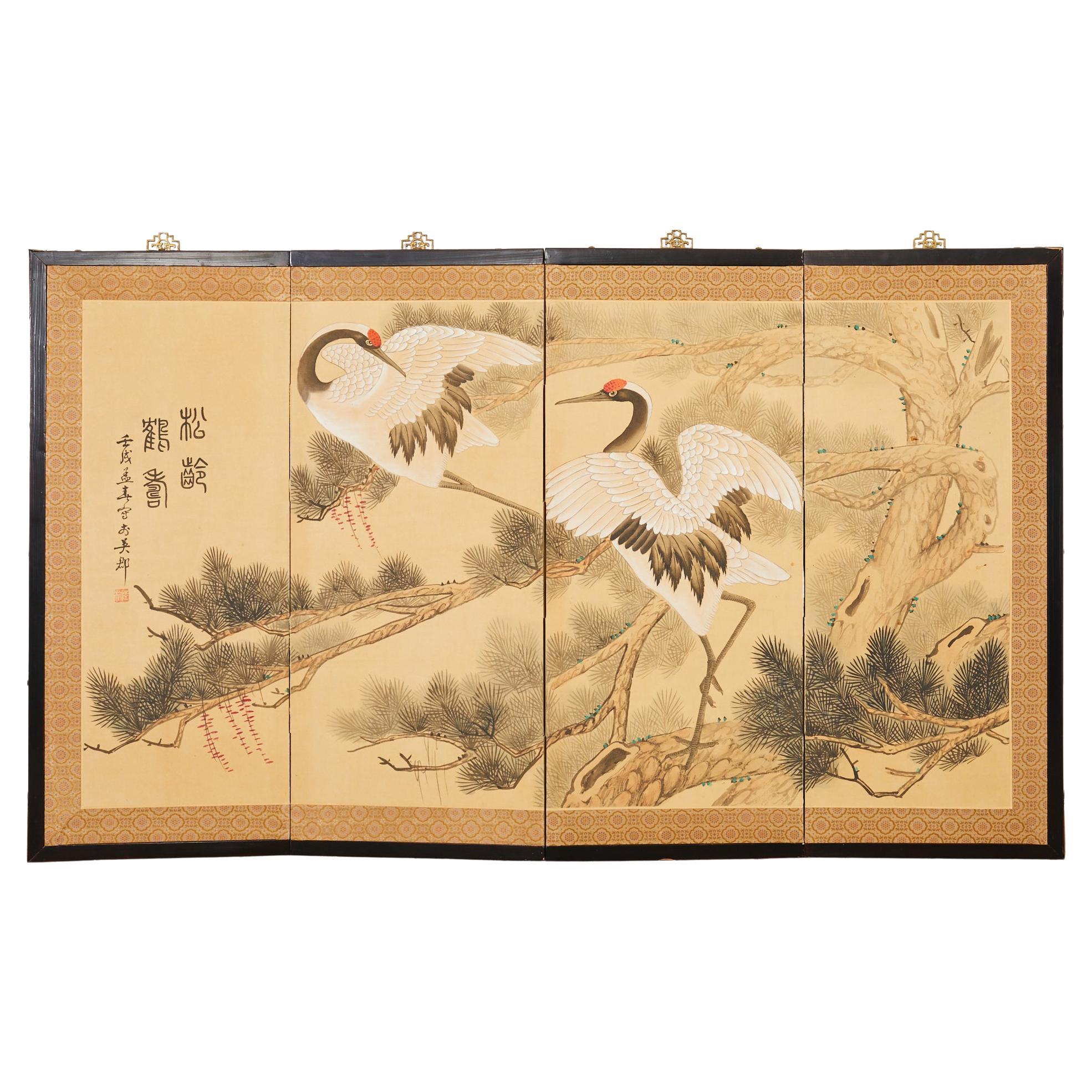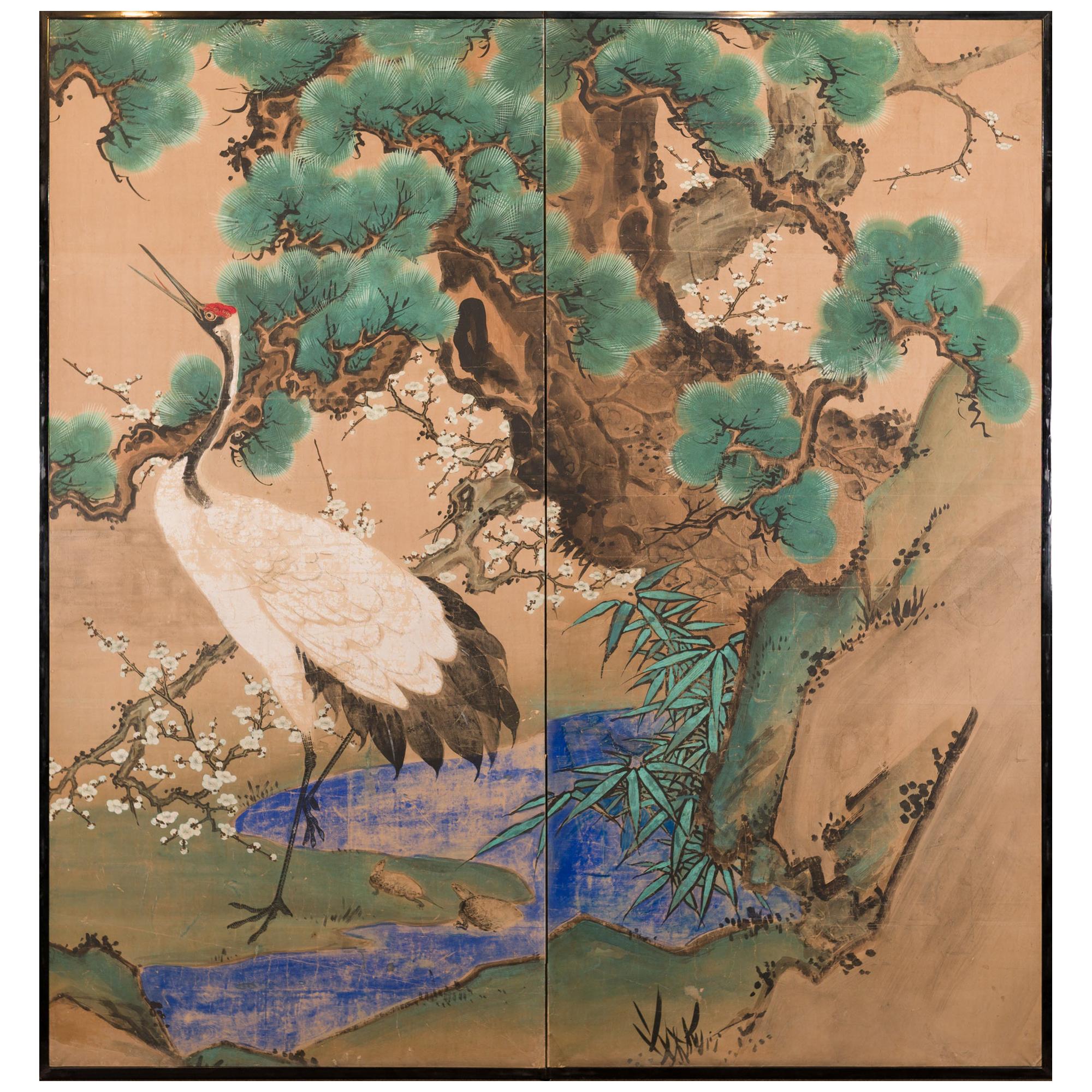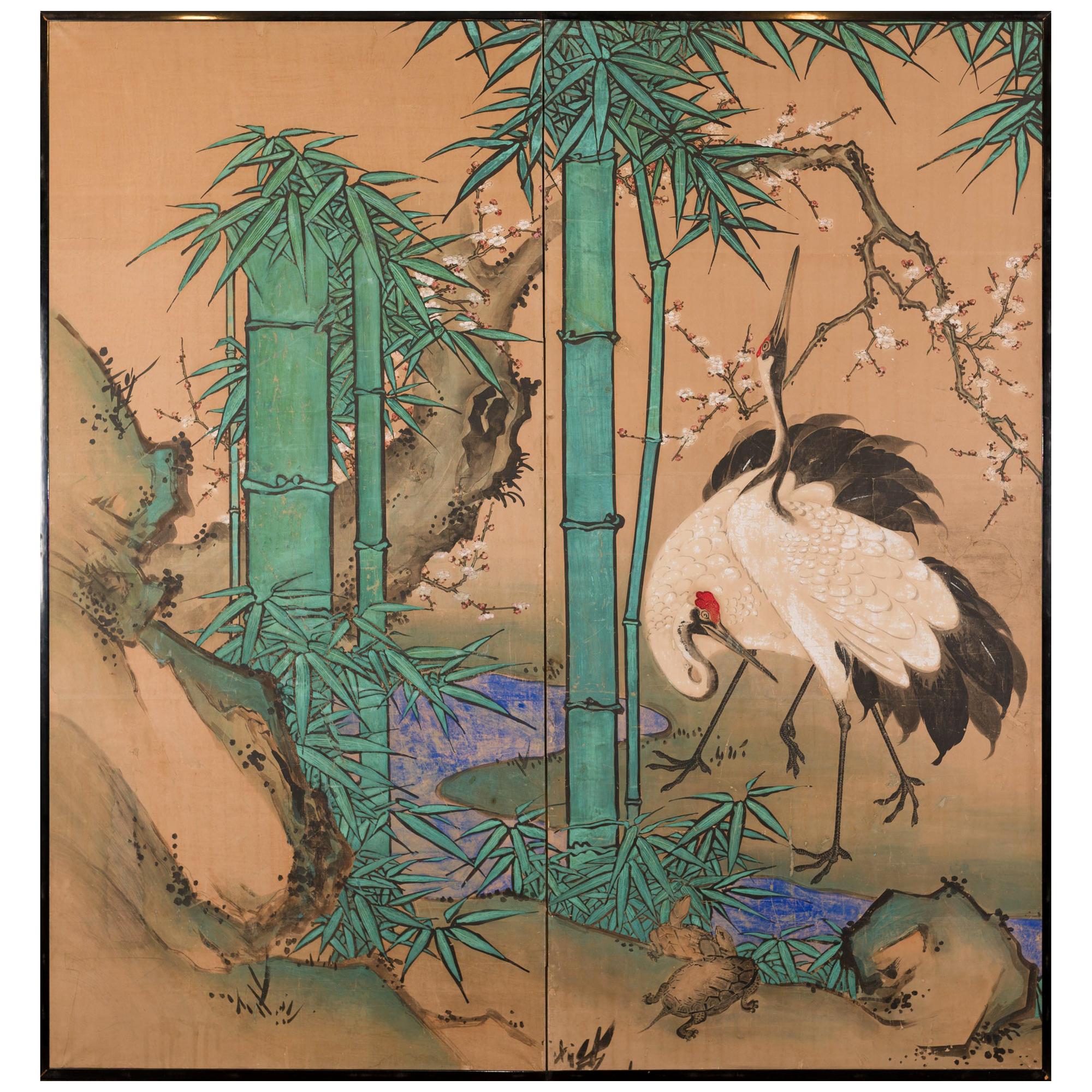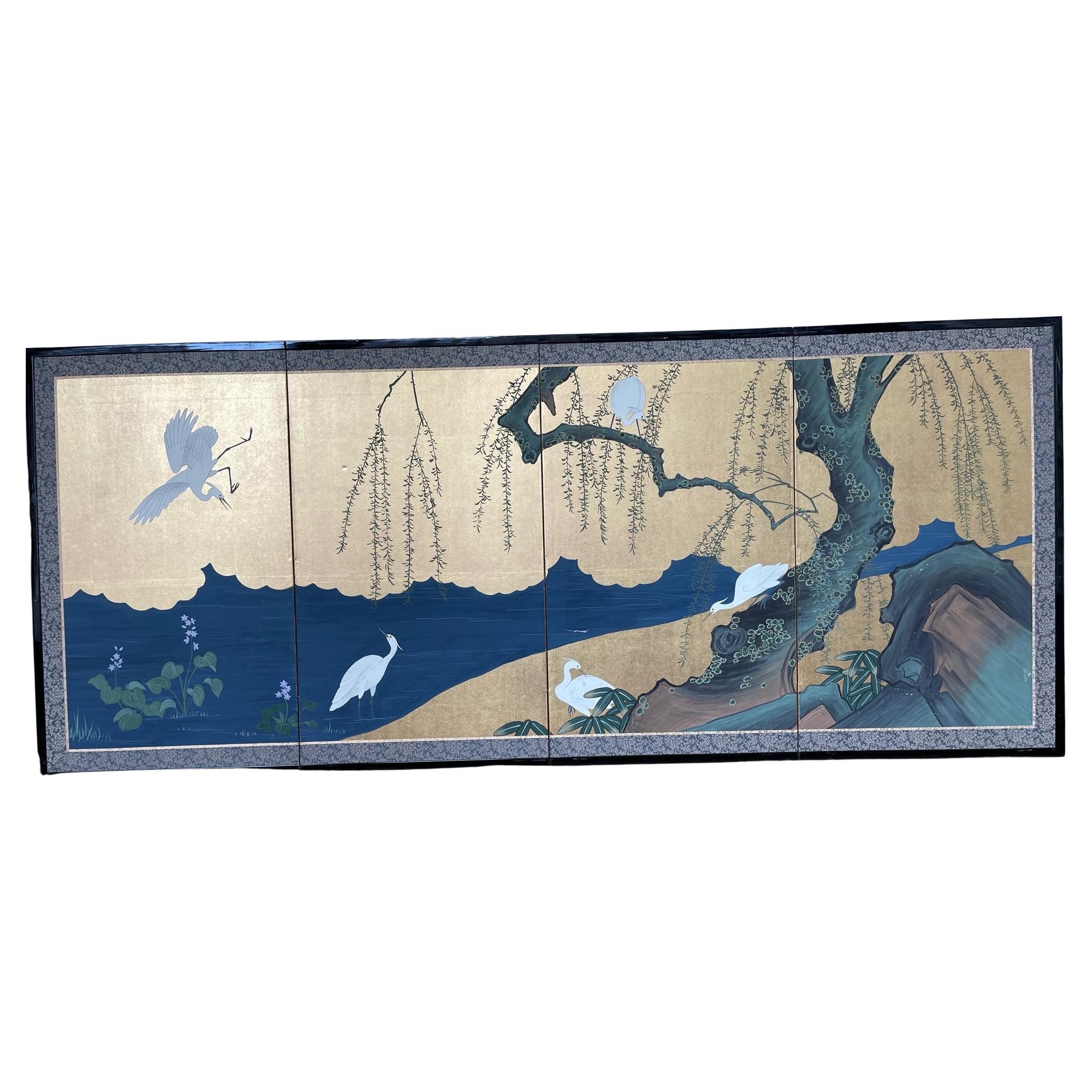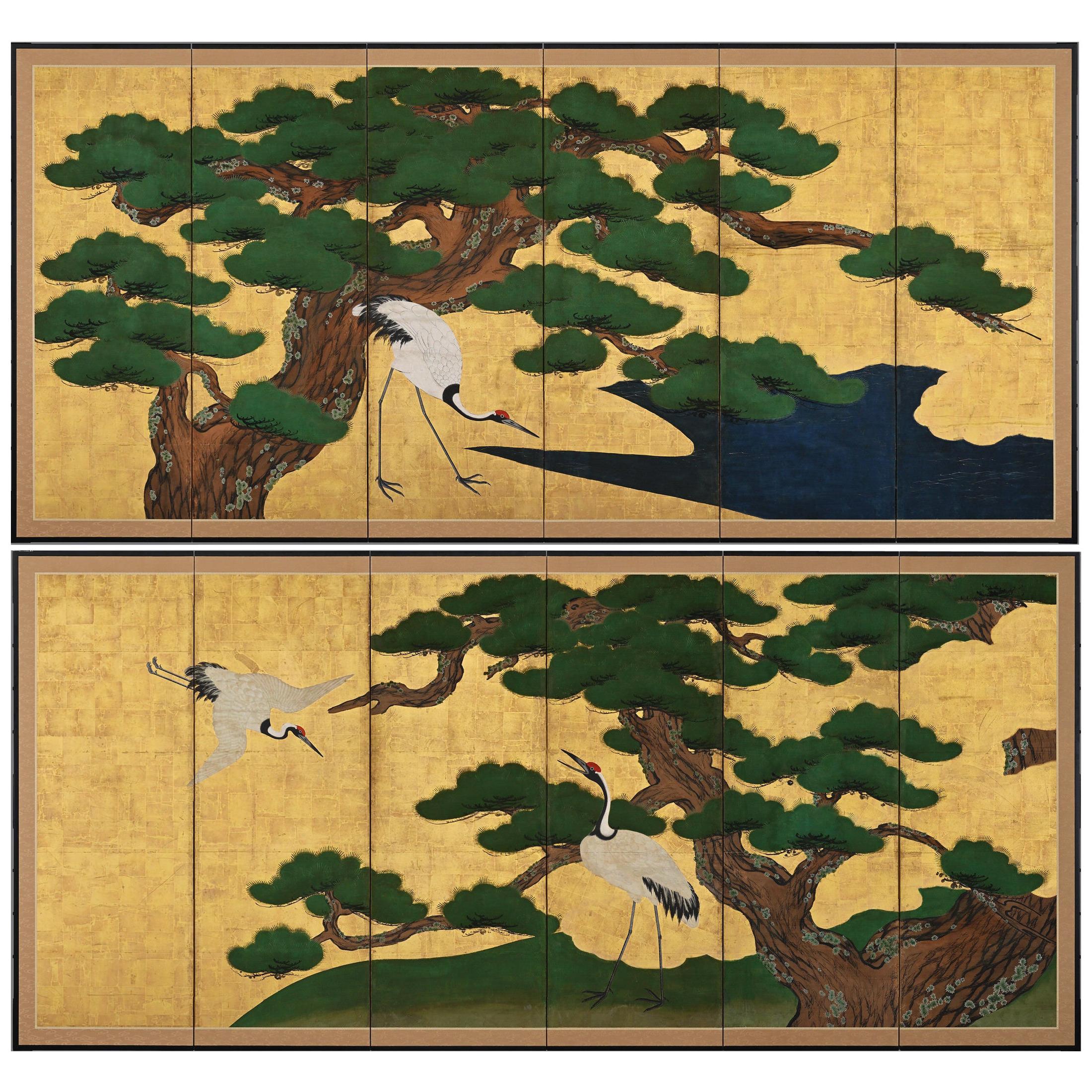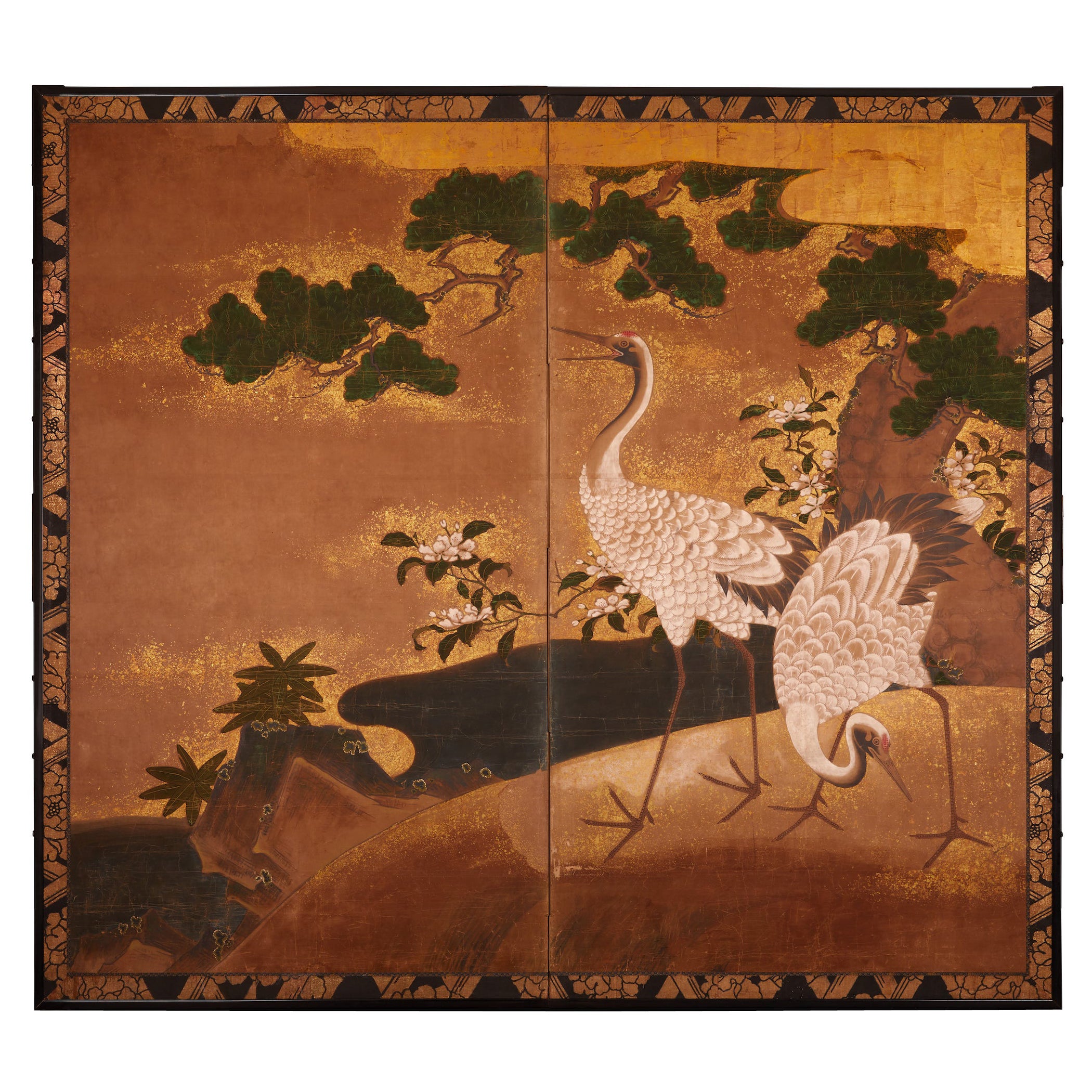Items Similar to Japanese Style Four Panel Screen Flock of Cranes in Pine
Video Loading
Want more images or videos?
Request additional images or videos from the seller
1 of 22
Japanese Style Four Panel Screen Flock of Cranes in Pine
About the Item
Stunning late 20th century Japanese style byobu four-panel screen depicting a flock or sedge of white manchurian cranes in an ancient pine tree. The painting features ink and natural color pigments over a dramatic gold leaf square background. The gold leaf is thick and has a textured finish that adds to its radiant patina. The painting is titled "Flock of Cranes" on the left side in Chinese with a cyclical date Mizunoe-Saru 1992. Set in a lacquered gloss finished wood frame with a dark green and gilt silk brocade border. Beautifully crafted with solid joinery. From an estate in San Francisco, CA.
- Dimensions:Height: 34.5 in (87.63 cm)Width: 69.75 in (177.17 cm)Depth: 0.75 in (1.91 cm)
- Style:Edo (In the Style Of)
- Materials and Techniques:
- Place of Origin:
- Period:
- Date of Manufacture:1992
- Condition:Wear consistent with age and use. Beautifully crafted with solid joinery and frame. Age appropriate wear with minor chips and scuffs that are difficult to see.
- Seller Location:Rio Vista, CA
- Reference Number:1stDibs: LU1555238737992
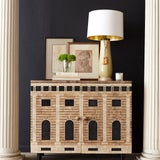
About the Seller
5.0
Erin Lane Estate is based in the San Francisco Bay Area, and its team of furniture restorers, art curators, professional appraisers and Asia specialists sources prime vintage and antique furniture from the finest estates in Northern and Southern California. Erin Lane Estate specializes in Hollywood Regency, McGuire, Chinese and Japanese pieces.
Diamond Seller
These expertly vetted sellers are 1stDibs' most experienced sellers and are rated highest by our customers.
Established in 2000
1stDibs seller since 2015
2,646 sales on 1stDibs
Typical response time: 1 hour
- ShippingRetrieving quote...Ships From: Rio Vista, CA
- Return PolicyA return for this item may be initiated within 1 day of delivery.
More From This SellerView All
- Japanese Style Four Panel Screen Manchurian Cranes in PineLocated in Rio Vista, CACaptivating 20th century Japanese style byobu four-panel folding screen. The screen is titled ancient pine/longevity cranes signed on left side with an artist seal Ying Jun. The scre...Category
20th Century Chinese Chinese Export Paintings and Screens
MaterialsBrass
- Japanese Style Four Panel Screen Turquoise River LandscapeLocated in Rio Vista, CADistinctive Japanese style four panel folding Byobu screen depicting a turquoise river mountain landscape. The painting is titled "One Sail Following The Wind" on the top left side. Appears to be a Korean...Category
20th Century Korean Showa Paintings and Screens
MaterialsWood, Paper
- Japanese Style Four Panel Screen Spring Birds SingingLocated in Rio Vista, CAAttractive Japanese style folding four panel byobu screen from the late Showa period. The screen is titled friendly birds singing in spring and signed by an artist with a cyclical da...Category
20th Century Chinese Showa Paintings and Screens
MaterialsBrass
- Japanese Edo Four Panel Screen Kano School Filial PietyLocated in Rio Vista, CAEarly 19th century late Edo period Japanese four-panel screen depicting examples from the 24 paragons of filial piety. Painted in the Kano School style featuring figures in colorful,...Category
Antique 19th Century Japanese Edo Paintings and Screens
MaterialsBrass, Gold Leaf
- Japanese Miniature Four-Panel Screen Blue and Green LandscapeLocated in Rio Vista, CA19th century mid-Edo period Japanese four-panel miniature screen. Depicting a beautifully painted Chinese blue and green landscape in the Nanga School...Category
Antique 19th Century Japanese Edo Paintings and Screens
MaterialsBrass
- Japanese Showa Period Mounted Screen Manchurian Cranes with PinesLocated in Rio Vista, CAImposing Japanese Showa period two panel byobu screen later mounted in a large gilt and ebonized wood frame. The screen depicts a pair of large redheaded Manchurian cranes flying ami...Category
20th Century Japanese Showa Paintings and Screens
MaterialsSilk, Wood
You May Also Like
- Japanese Two Panel Screen Manchurian Crane and TurtlesLocated in Hudson, NYIn Japan, cranes symbolize fidelity as they mate for life and turtles symbolize longevity. Additionally, this screen also has the Japanese motif of sho-chiku-bai, or the three friends of winter (pine, plum, and bamboo). So called the three friends of winter because all three flourish during the cold months. This screen was originally fusuma doors...Category
Antique Mid-19th Century Japanese Edo Paintings and Screens
MaterialsPaper
- Japanese Two Panel Screen Amorous Cranes and TurtlesLocated in Hudson, NYJapanese two panel screen: Amorous Cranes and Turtles. In Japan, cranes symbolize fidelity as they mate for life and turtles symbolize longevity. Additionally, this screen also has the Japanese motif of sho-chiku-bai, or the three friends of winter (pine, plum, and bamboo). So called the three friends of winter because all three flourish during the cold months. This screen was originally fusuma doors...Category
Antique 1850s Japanese Edo Paintings and Screens
MaterialsWood, Paper
- Japanese 4 Panels Screens White Flying CranesLocated in New York, NYJapanese 4 Panels Screens White Flying Cranes Late Meiji - Early Taisho Period- Great looking screen, in good vintage con...Category
Early 20th Century Japanese Paintings and Screens
MaterialsWood
- Circa 1700 Japanese Screen Pair, Cranes & Pines, Kyoto Kano SchoolLocated in Kyoto, JPPines and Cranes Anonymous. Kyoto Kano School. Late 17th/early 18th centuries, circa 1700. Pair of six-panel Japanese folding screens. Ink, gofun, pigment and gold leaf on paper. This bold composition presents two pine trees extending to the left and right across a gold leaf background. One tree is silhouetted against a green ground, golden clouds obscuring its true size, the other stretches across a stylized waterway. The pines are paired with Manchurian cranes with red crests and snow white plumage. Both have been highly auspicious motifs in East Asia since Chinese antiquity. Here the artist utilized fluid and instinctive ink brushstrokes to define the trunk, branches and tail feathers, in strong contrast to the precision and sharp angularity of the crane’s legs and beaks. The adoption of this vast metallic painting support required an unerring sense of design and composition, so that the negative space surrounding motifs could imply context for the otherwise floating pictorial elements. The brushwork detailing the trunks of the pines, the exaggerated dimensions of the pine trees and the strength and dynamism of the composition are all reminiscent of Kano Eitoku...Category
Antique Late 17th Century Japanese Edo Paintings and Screens
MaterialsGold Leaf
- Japanese Two-Panel Screen: Cranes on GoldLocated in Hudson, NYEarly Kano School painting of pine trees overlooking two beautifully painted cranes and floral design in a natural setting by water’s edge. Mineral pig...Category
Antique Late 18th Century Japanese Paintings and Screens
MaterialsGold, Gold Leaf
- Japanese Four Panel Paper ScreenLocated in Essex, MAPair of two panel screens with a rooster and a hen in amongst bamboo. Signed by the artist Ema Saiko 1787-1861. A Japanese painter, poet and calligrapher celebrated for her Chinese...Category
Antique 1850s Japanese Screens and Room Dividers
MaterialsPaper
Recently Viewed
View AllMore Ways To Browse
Painted Screen Of Trees
Meiji Period Painting
Hasegawa Tohaku
Folding Umbrella Umbrellas For Women
Asian Asian Screen
Japanese Red Wall Lantern
Kutani Duck
Inlaid Mahogany Mirror
Inset Stone Top
28 Nightstand
Luxury Folding Chairs
Gold Tree Dining Table
French Art Deco Ceiling Fixture
Pair Carved Bookcases
Louis Bedside Pair
Pair Of Opaline Glass Vases
Reference Bookcase
Amazing Benches
